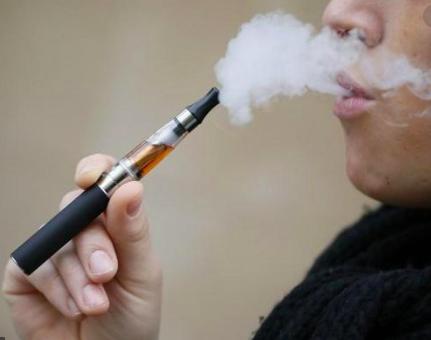After maintaining a pack-a-day habit for nearly three years, I gave up smoking in 2012 with the help of an electronic cigarette (e-cig). When I told my doctor later that year I had switched from smoking to vaping an e-cig, I expected a judgmental look and a finger-wagging lecture about the dangers of nicotine. Instead, he smiled and said, “good—keep using that thing.”
If you read recent headlines, you may think my doctor was a quack for encouraging me to continue vaping. Eight teenagers in Wisconsin were hospitalized for severe respiratory illnesses in July, and health officials suspected that vaping may have been to blame. On the heels of a July 30 study suggesting that flavorings used in e-cigs cause lung irritation, the Food and Drug Administration (FDA) announced it wants more data on e-liquids, the products e-cig users (vapers) inhale. According to CBS' report on the study:
“We’re seeing a growing number of studies highlighting that e-liquid flavors are particularly problematic," said Thomas Ylioja, a tobacco cessation expert at National Jewish Health in Denver. The FDA considers artificial flavors used in food as "generally recognized as safe," but less is known about the long-term effects of inhaling aerosols containing these flavors.
The above statement is technically correct, but CBS didn't include the necessary context for its readers. Yes, the long-term effects of vaping are unknown (e-cigs have only been in widespread use for about a decade), and several studies have suggested that e-liquid flavors could be harmful. But we always have to ask, “compared to what?” As my doctor understood, taking up vaping is probably the best health decision any smoker can make. Why? Compared to the confirmed dangers of cigarette smoking, the possible health risks associated with vaping are minuscule, according to multiple studies published over the last 10 years.
The evidence so far
Perhaps the best-known article in the young field of e-cig research was authored by Drexel University environmental and occupational health expert Igor Burstyn in 2014. After examining 9,000 measurements of the chemicals in e-liquid, Burstyn concluded that vapers are exposed to potentially dangerous contaminants at levels that are 1- 5 percent of what would be considered harmful in an occupational setting. Another review published later in 2014 looked at 114 studies and concluded that “Existing evidence indicates that [e-cig] use is by far a less harmful alternative to smoking.” While the authors acknowledged that the health effects of vaping should be monitored by regulators, they added a pointed criticism:
"Surveys, clinical, chemistry and toxicology data have often been mispresented or misinterpreted by health authorities and tobacco regulators, in such a way that the potential for harmful consequences of EC [electronic cigarette] use has been largely exaggerated. It is obvious that some residual risk associated with EC use may be present, but this is probably trivial compared with the devastating consequences of smoking."
This finding was confirmed in a 2016 review published by the UK's Royal College of Physicians, which found that vaping retains only five percent of the risk posed by cigarette smoking. “[I]t is appropriate to consider potential hazards of e-cigarettes,” the authors wrote, but they emphasized that this analysis should be carried out relative to the impacts of smoking:
[A]s smoking cessation is associated with a reduction in respiratory symptoms in people with respiratory disease, many smokers who switch to an e-cigarette are likely to experience improvements in respiratory symptoms.
The American Cancer Society*, the National Academies of Sciences and Cancer Research UK have all reached similar conclusions.
Conclusion
Additional research has been conducted since these large reviews and position statements were published. There are clinical trials showing that vaping improves respiratory health in smokers with chronic obstructive pulmonary disease (COPD), as well as studies showing that vaping can damage lung, bladder, and heart cells (at least in mice). But when we look at all the data and ignore overheated news stories, a consistent picture begins to emerge: e-cigs are probably far safer than tobacco and represent a significant step forward for public health.
*Update on 9-Dec-2019 @ 9:04 pm PT: The American Cancer Society has rescinded their endorsement of e-cigarettes.



